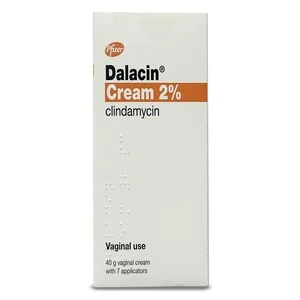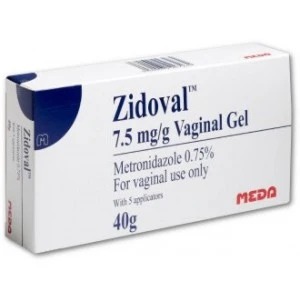Bacterial vaginosis
Bacterial Vaginosis is a common infection which is triggered by a change in the pH balance of the vagina.
While the condition can be embarrassing, there are treatments available online which can clear up the infection
Dalacin (Clindamycin) 2%
- Inhibits the growth of bacteria in the vagina
- Easy application
- Discreet delivery
Metronidazole
- A first-line antibiotic recommended by the NHS
- Decades of clinical success
- Simple and convenient to use
Zidoval
- Clears infection
- Easy application
- Discreet delivery
What is Bacterial Vaginosis?
Bacterial vaginosis (BV) is a common bacterial infection estimated to affect approximately one in three women at some point in their lifetime. However, it is possible for bacterial vaginosis infections to recur within 6 months, even after treatment.
While it is not a sexually transmitted infection, it can lower your vagina's natural defence and increase your risk of contracting STIs such as Chlamydia. However, women can pass BV on to other female sexual partners.
BV carries a small risk of causing complications during pregnancy, including pelvic inflammatory disease, premature birth or miscarriage. In most cases where a pregnant woman is infected with BV, no complications occur. If you notice a change in your vaginal discharge while pregnant, speak to your doctor or midwife.
What are the symptoms of Bacterial Vaginosis?
Bacterial Vaginosis causes similar symptoms to vaginal thrush, though there are a few differences between the two infections.
Symptoms of bacterial vaginosis may include:
- Pain when urinating
- Strong fishy odour (often after sex)
- Unusual thin, watery, grey or white vaginal discharge
Approximately half of women will not realise they have a BV infection as they may not experience any symptoms. In addition, bacterial vaginosis is not usually painful or itchy.
The key differences which set BV and thrush infections apart are the differences in the odour and discharge. Discharge, as is the result of vaginal thrush, does not usually smell and is often thick like cottage cheese. In contrast, discharge resulting from a bacterial vaginosis infection is often watery and emits a foul odour.
If you notice any changes in the smell or discharge of your vagina, speak to your doctor or pharmacist for advice on what might be causing the symptoms.
What causes Bacterial Vaginosis?
Put simply, bacterial vaginosis is often caused by a change in the pH balance of the vagina.
While it's easy to assume that poor hygiene, such as not washing frequently, can contribute to the development of BV, it's often the complete opposite that causes the infection.
The vagina sustains a careful acidic balance. When this balance is disrupted, infections such as bacterial vaginosis and thrush can occur. Using vaginal deodorants, perfumed soaps, bubble baths and washing your underwear with strong detergents can upset the delicate balance, increasing the risk of developing bacterial vaginosis.
BV can also be triggered by sexual intercourse, especially with male partners. This is often due to the alkaline nature of semen, which can affect the natural pH balance of the vagina. Changing partners can also increase the risk of developing an infection. If you notice that you suffer from BV after having sex, consider wearing a condom to prevent future infections.
Women with same-sex partners can also pass on bacterial vaginosis to other women. If this happens, both women may need to be treated for bacterial vaginosis.
Periods can also interfere with the pH balance of the vagina, which can increase the likeliness of a BV infection, as can contraception such as IUD.
How is Bacterial Vaginosis diagnosed?
If you suspect you have BV, you should arrange an appointment with your GP or a sexual health clinic to rule out any possibility that the symptoms you are experiencing are the result of an STI.
During your appointment, a doctor will ask about your symptoms, and a doctor or nurse may examine your vagina.
A sample of discharge may be taken using a cotton bud, which can be used to test for infections. This is unlikely to hurt, but may feel uncomfortable.
Your doctor will then discuss an appropriate course of treatment with you.
How is Bacterial Vaginosis treated?
Bacterial vaginosis is usually treated with antibiotics, such as Metronidazole. This treatment is available in oral tablets or a topical vaginal gel.
BV can return, even after treating the infection. If this is the case, a longer course of antibiotics may be prescribed.
If any same-sex partners exhibit the symptoms of BV, they, too, may require treatment.
While undergoing treatment for bacterial vaginosis, it is important to avoid using hygiene products which may affect the pH of your vagina and cause recurrent infection.
It is important to be treated for bacterial vaginosis as the condition can cause complications such as pelvic inflammatory disease, premature birth and miscarriage in pregnant women, while also increasing the risk of contracting sexually transmitted infections.
How can I prevent future infections of Bacterial Vaginosis?
Bacterial Vaginosis can be prevented by making changes to your washing regime.
Doing the following may reduce your symptoms and prevent future BV infections:
- Avoid using perfumed hygiene products inside and around the vagina
- Having showers instead of baths
- Not using vaginal deodorants, washes or douches
- Using condoms, if your BV is triggered by sex
- Wash the genital area with water and plain soap
- Washing underwear in softer detergents
Frequently Asked Questions (FAQs) about Bacterial Vaginosis
Is Bacterial Vaginosis a Sexually Transmitted Infection (STI)?
Bacterial Vaginosis is not a Sexually Transmitted Infection (STI), but it can increase the risk of getting one. It can be passed between female partners.
Can Bacterial Vaginosis lead to discomfort and pain?
Bacterial Vaginosis can lead to discomfort and pain in the vagina but usually not soreness or itching.
What is the most common cause of Bacterial Vaginosis?
The most common cause of Bacterial Vaginosis is an imbalance in natural bacteria levels in the vagina, often due to factors like douching or multiple sex partners.
Is Bacterial Vaginosis common in young women?
Yes, Bacterial Vaginosis is the most common vaginal infection affecting young women, including those of childbearing age.
Can Bacterial Vaginosis affect pregnancy?
Bacterial Vaginosis can cause complications like premature birth or miscarriage during pregnancy, but usually causes no problems.
How is Bacterial Vaginosis tested?
Bacterial Vaginosis is tested using a vaginal fluid sample to determine if a bacterial infection is causing symptoms.
Can Bacterial Vaginosis be treated with over-the-counter medications?
Bacterial Vaginosis is treated with prescribed antibiotics, either in tablet form or as gels or creams. Consult a healthcare provider for proper treatment.
Is Bacterial Vaginosis more common in women who have had multiple sexual partners?
Bacterial Vaginosis can be more common in women with multiple sexual partners, but can also occur in women who have not had sex.
Can Bacterial Vaginosis be caused by an overgrowth of normal vaginal flora?
Yes, Bacterial Vaginosis can be caused by an overgrowth of normal vaginal flora, leading to a bacterial imbalance.
Is there a specific test for Bacterial Vaginosis?
Yes, there is a specific test for Bacterial Vaginosis, which uses a vaginal fluid sample to diagnose the infection.
Additional resources
How To Treat Bacterial Vaginosis?
How Long to Treat Bacterial Vaginosis?
Can You Treat Bacterial Vaginosis When Pregnant?
Why Avoid Alcohol During Bacterial Vaginosis Treatment?
What Foods to Avoid During Bacterial Vaginosis Treatment?
Authored & Reviewed By

Mohamed Imran Lakhi
MPharm - Lead PharmacistPublished on: 22/03/2019 Reviewed on: 13/10/2023
© 2013 - 2026 Al Muhsineen Limited. All Rights Reserved. Registered Pharmacy: 34 Halliwell Road, Bolton BL1 8RL. Registered Office: 254 First Floor, Shearbrow, Blackburn, England, BB1 8DS








